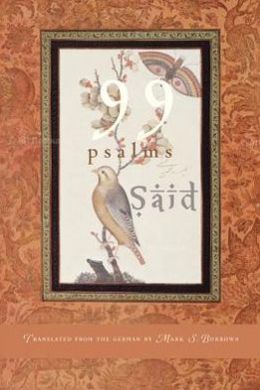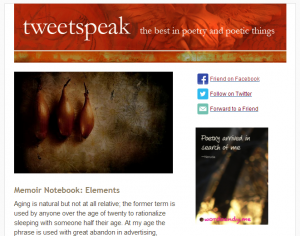Tweetspeak Poetry regularly features a variety of articles on contemporary and historical poets and poems. This week, we introduce you to SAID.
___________________________
He came to Germany to study engineering, and stayed because he was a bit too anti-Shah in his native Iran. The Shah was overthrown, but his prospects were no better under the revolutionary Islamic regime. So he stayed in Germany and wrote poetry.
His name is SAID, pronounced “Sah-EED.” He’s a leading poet in Germany, and has published several collections (in German). And now Mark Burrows, translator of Rainer Maria Rilke’s Prayers of a Young Poet, has translated SAID’s most recent collection of poetry, 99 Psalms, published by Paraclete Press.
It is a perplexing volume of poetry. The poems are both like the psalms we’re most familiar with—the biblical psalms—and unlike them. Eight-five of the 99 psalms in the volume begin with the word “lord, ” and the remaining 14 have the word “lord” somewhere close to the beginning. And yet they are less about God and more about the human condition. And the volume contains 99 psalms—99 being the number of names of Allah that are known (and there is one unknown name).
These poems are not a fusion of the Judeo-Christian and Islamic traditions. Instead, they use the framework of psalmic poetry to collectively create a statement about the contemporary mind, society, and culture, the pain of the disconnectedness of exile. These are songs springing from the depth of pain, and they are more about that pain than they are about the idea of worship.
lord
appear nakedly with bread
and destroy the colors
so that we might never again go away
but show yourself to us
before supermarkets sell you dirt cheap
on their bargain tables
and cell phones mutate into gods
appear as a lawless illiterate one
remain without light and vulnerable to seduction
but hurry
because even the wind deprives us of the deceit
A lot is packed into that short poem, but our contemporary gods of consumerism and communication are clearly what fairly leap from the words. (It should be pointed out that SAID is not to the first to recognize how we bow our heads to our cell phones.) The poet is stripping away our contemporary pretenses here.
To read 99 Psalms is to experience the depths of fear and despair of the human heart. The poems are often brutally honest in the pain described, in the doubts expressed, in the often accusatory tone taken in addressing “lord.”
As odd as it sounds, these poems become almost secular psalms, poems that say more about our human condition than about God.
We are left to consider what the 100th psalm might be, or if there is indeed even a 100th psalm, the one hidden and not included in the collection. And that is the psalm we could write, and perhaps should write, ourselves.
Image by Nanagyei. Sourced via Flickr. Post by Glynn Young, author of the novels Dancing Priest and A Light Shining.
Browse our collection of poets and poems. Great for personal enjoyment, sharing, or using as teaching tools.
___________________________
Subscribe to our free weekly newsletter.
We’ll make your Saturdays happy with a regular delivery of the best in poetry and poetic things.
Need a little convincing? Enjoy a free sample.
- Longfellow’s “Paul Revere’s Ride”: Creating a National Legend - April 17, 2025
- Poets and Poems: Katie Kalisz and “Flu Season” - April 15, 2025
- Poets and Poems: Michelle Ortega and “When You Ask Me, Why Paris?” - April 10, 2025


Maureen Doallas says
Thank you, Glynn, for introducing readers here to SAID, who has important things to say in his poetry, some of which I first read in Poetry magazine.
You highlight a word essential to understanding SAID’s message: exile. That word informs so much of what SAID has to say about us in the 21st C.
Megan Willome says
Glynn, you are so freakin’ good at reviews. Thank you.
Charity Craig says
Glynn – What a great introduction to a poet I previously hadn’t heard of. The use of the word “psalm” was unfamiliar to me outside of the biblical context, though I think it means song.
Do you suppose SAID ever meant for these to be sung?